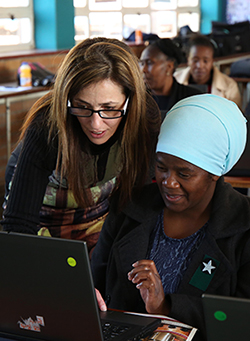Latest News Archive
Please select Category, Year, and then Month to display items
14 June 2024
|
Story Anthony Mthembu
|
Photo Suplied
 Jeremiah Hlahla, a UFS student completing his PhD in Botany at the University of Debrecen as part of an exchange initiative funded by the Erasmus+ Mobility Programme.
Jeremiah Hlahla, a UFS student completing his PhD in Botany at the University of Debrecen as part of an exchange initiative funded by the Erasmus+ Mobility Programme.
As part of an exchange initiative facilitated by the Erasmus+ Mobility Programme, Jeremiah Hlahla, a student at the University of the Free State (UFS), is nearing the completion of his PhD studies at the University of Debrecen in Hungary. Hlahla’s journey, which began in February 2024 and is set to conclude in July 2024, has been a remarkable learning opportunity. “As a first time-traveller to Europe, I have thoroughly enjoyed engaging with people from different countries and cultures,” he said.
The benefits of international collaboration
Hlahla is currently pursuing a PhD in Botany, focusing on plant stress physiology. “My current PhD project investigates the physiological, biochemical and morphological responses of vegetable-type soybean, or edamame, to combined drought and heat stress,’’ he explained. He considers the University of Debrecen the ideal institution to complete his research due to its extensive expertise and resources in similar projects. He noted that his colleagues at Debrecen conduct significant work on plant protection against biotic and abiotic stresses, including salt and drought stress, as well as proteins and amino acids in barley and other legumes.
Given the vast knowledge available on similar projects, Hlahla has found substantial engagement with his work at the University of Debrecen. “Upon arrival, I delivered an introductory lecture presenting my UFS project on the synergistic effects of combined drought and heat stress on the physiology and biochemistry of edamame. It was an engaging session as everyone could relate to my work and asked many questions,’’ he said.
Insights gained from the exchange
Hlahla has also gained valuable lessons that will assist him in his research career, including biotechnology and physiology tools. “I learned how to prepare samples and use high-performance liquid chromatography (HPLC) and reversed-phase ultra-high-performance liquid chromatography (UHPLC) to quantify proteins and amino acids,’’ he said. These techniques are beneficial not only for his current work but will also support future soybean research.
As his experience at the University of Debrecen nears its end, Hlahla reflects on the collaborations and friendships he has formed, which stand out as a significant highlight.
Digitising the Advanced Certificate in Teaching (ACT)
2017-02-06

The 100% online ACT aims to help
teachers improve their qualifications.
More information is available at
http://www.ufs.ac.za/ACTonline.
Photo: Supplied
Online learning is fast becoming the most convenient and affordable way to study. In 2016, the South Campus of the University of the Free State (UFS) became the first university in South Africa to launch a fully online course for current teachers to upgrade their qualifications; the Advanced Certificate in Teaching (ACT).
The IDEAS Lab digitisation team on our South Campus is responsible for converting the existing ACT modules from a blended format to a 100% online format. With this format all lessons and study material are available online, with no contact sessions required. The advantages of online, interactive learning far outweigh those of blended learning. Lessons are converted to videos online, which is not only more user-friendly, but students can also access the lessons repeatedly.
In addition, tutors are always available, with WhatsApp groups and the ACT Online Facebook page further facilitating the support provided. Discussions between or communication with students situated in remote areas is made possible, adding to an enriched student experience. Immediate feedback on activities serves as a diagnostic tool as well as motivation for the students.
Lesson videos are recorded at the IDEAS Lab Studio at the South Campus or onsite at various schools. Students are expected to complete a unit, which consists of two lessons, per week.
There are “think about your learning” activities after each lesson as well as “after readings” to ensure that students have grasped the material. In these and many other ways the online ACT is specifically designed to suit students’ unique needs and make their studies a satisfying and rewarding experience.